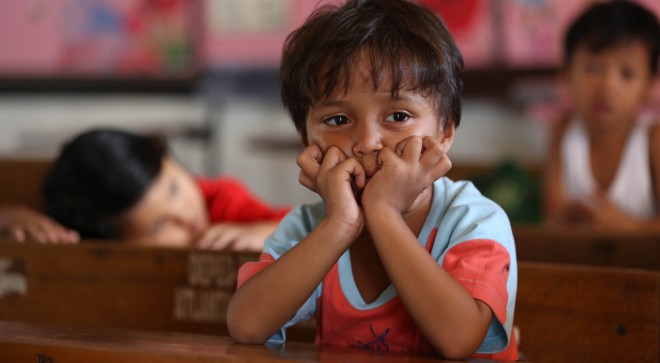
Young typhoon survivor wait for their teachers as they attend school at typhoon-ravaged Tolosa town, Leyte province, on Monday, Dec. 9, 2013. Despite the Philippines being a “disaster-prone country,” there is a serious lack of psychiatrists to help victims cope with post-calamity stress, said Dr. Lourdes Ignacio, author of many books on coping with tragedy. AP PHOTO/AARON FAVILA
MANILA, Philippines—Wanted: Psychiatrists who specialize in psychosocial care.
Despite the Philippines being a “disaster-prone country,” devastated by typhoons and earthquakes almost every year, there is a serious lack of psychiatrists to help victims cope with post-calamity stress, said Dr. Lourdes Ignacio, author of many books on coping with tragedy.
“There is a need for more psychiatrists that can provide psychosocial care to respond (to these disasters),” Ignacio told a forum in San Juan.
According to Ignacio, there are “only 450” psychiatrists in the Philippines, 80 percent of whom are based in Metro Manila.
“The interesting thing is that not all of them are trained to conduct this kind of work, psychosocial therapy,” explained Ignacio, who is with the World Association for Psychosocial Rehabilitation and is the coauthor of “Ginhawa: Well-being in the Aftermath of Disasters.”
She could not give an estimate of how many of these Filipino psychiatrists are trained to conduct psychosocial therapy as she said she still has to “make an inventory.”
Ignacio stressed the need for the conduct of “multiple-session” debriefings in “private” places and not “single-session” ones in public areas, as sometimes resorted to by government.
At the Villamor Air Base in Pasay City where the victims of Supertyphoon “Yolanda” were flown in from eastern Visayas, stress debriefings were being conducted in tents.
But stress management is “not a one-shot deal,” said Ignacio.